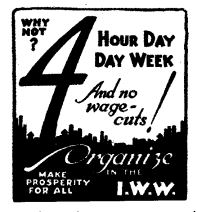Fifth Estate 370, Fall 2005 Add to the Bookbuilder
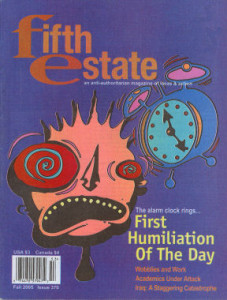
Various Authors
Letters
To my Dearest Fifth Estate...
The population of hard core anarchists from the ‘50s, ‘60s, and ‘70s is slowly dwindling, and the next generation is unprepared to take up the slack.
Young people today are filled with apathy in a day and age where apathy is the one thing you don’t want. So, where are you guys? Where are the huge mass gatherings of rage and indignation? Where are the fliers, the meetings, the banners and protests?
May 17, 2015 Read the whole text...
Fifth Estate Collective
Contents of print edition
5 Occupied Iraq: The Continuing Story of Bungalow Bill
7 First They Came For Ward Churchill
9 The New McCarthyism: On The Recent Purge Of David Graeber
11 Fear And Loathing At The University
12 Introduction: Wobblies At 100; Work At 4,000
15 Why I Was A Burglar
May 17, 2015 Read the whole text...
Fifth Estate Collective
About this Issue
Notes from the FE Collective
Welcome to the second issue in the fortieth anniversary year of this publication. The first was published in February and was our official commemorative edition. It was the largest and most colorful issue ever printed since we began in 1965. The anniversary issue was a double one constituting our publishing efforts for both Spring and Summer 2005. Hence, you have not missed an issue and you are reading the next in our series.
May 17, 2015 Read the whole text...
Fifth Estate Collective
Call for Contributions
Unless we build a sustained practice of free relationships and liberated lives, we risk lengthening the long list of those who have created partial revolutions. The revolution is inside as well as outside ourselves. Misery and alienation reproduce themselves--not just in authoritarian institutions--but in our own character structure, imprisoned by the catastrophe of repressive consciousness.
May 17, 2015 Read the whole text...
anon.
Occupied Iraq
The Continuing Story of Bungalow Bill
“What are kingdoms but great robberies? Indeed, that was an apt and true reply which was given to Alexander the Great by a pirate who had been seized. For when that king had asked the man what he meant by keeping hostile possession of the sea, he answered with bold pride, ‘What thou meanest by seizing the whole earth; but because I do it with a petty ship, I am called a robber, whilst thou who dost it with a great fleet art styled an emperor.’”
--Augustine of Hippo, The City of God (410 CE)
May 17, 2015 Read the whole text...
Ron Sakolsky
First they Came for Ward Churchill
In early 2005, because of comments concerning 9/11 made years earlier, University of Colorado professor Ward Churchill became the whipping boy for right-wing vilification of all that was suspect in American universities.
In “Some People Push Back: On the Justice of Roosting Chickens,” Churchill invoked Malcolm X’s comments immediately following the assassination of president John F. Kennedy as he maintained that American foreign policy provoked the attacks on New York. At root in the controversy was Churchill’s comparison of Americans to the “good Germans” of Nazi Germany and his now famous phrase about “the little Eichmanns inhabiting the sterile sanctuary of the twin towers.”
May 23, 2015 Read the whole text...
KK Vega
The New McCarthyism
On the recent purge of David Graeber
Anarchist anthropologist David Graeber’s recent purge from Yale University—coming hot on the heels of the trial-by-media of Native American radical Ward Churchill—is one of many recent attacks on radical professors that have shaken the supposedly safe zone of the ostensibly liberal academy. Graeber’s contract was recently not renewed under highly suspicious circumstances after many years of teaching at the Ivy League school.
May 23, 2015 Read the whole text...
Starla
When a Woman Academic is Under Attack, Little is Said
Fear & Loathing at the University
BOULDER, COLO. Walking by the student center of the University of Colorado at Boulder (CU) one late winter day early this year, I saw campus Republicans swarming around several seven-foot tall poster boards. Usually, they fill these poster boards with meaningless—and largely ignored—right-wing slogans. But this day was different because the press also crowded the area, and a throng of onlookers had gathered. At the cost of being late to my next class, I cut through the mob to read the garish, neon-colored posters.
May 23, 2015 Read the whole text...
Fifth Estate Collective
Wobblies & Work
Special section intro
This special section, announcing itself with the above headline, contains more of a critical and theoretical tension than may be immediately obvious at first reading. Imbedded in it is the difference between the clarion call proposed by Marxists to the international proletariat, “Workers of the World, Unite,” and another slogan, introduced in these pages some three decades ago—“Workers of the World, Relax!”
May 23, 2015 Read the whole text...
Alexandre Jacob
Why I was a Burglar
“The right to live can’t be begged for—it is taken.”
In Paris, between 1900 and 1903, Alexandre Jacob (1879–1954) and his comrades organized a group of anarchist burglars which carried out 156 break-ins before being caught. Their targets were the wealthy and the gang’s project was to punish them by striking at their most sensitive organ—their wallet. Jacob and his friends were dubbed “Workers of the Night” by the sensationalist Paris press. These unusual robbers believed that theft should not be for personal gain, but an attack against the world of the powerful. Instead of becoming rich himself from the gang’s enterprises, Jacob generously donated to anarchist causes.
May 23, 2015 Read the whole text...
Marshall Sahlins
The Original Affluent Society
Living Good in The Stone Age

FE Note: The following is an edited version of the first chapter of Marshall Sahlins classic and groundbreaking work, Stone Age Economics (Aldine, 1972), entitled “The Original Affluent Society.”
In it, Sahlins confronts prevailing academic and popular myths regarding life before the state and technology which is usually conceived of, after Hobbes, as being “nasty, brutish and short.” As with most governing modern mythologies, this one turns out to be another apology for the reigning misery and a projection of our reality onto social forms that have all but been destroyed.
May 25, 2015 Read the whole text...
Fifth Estate Collective
The Cult of Stakhanov
Working for the Man
“History’s political and economic power structures have always abhorred ‘idle people’ as potential troublemakers. Yet nature never abhors seemingly idle trees, grass, snails, coral reefs, and clouds in the sky.”
— R. Buckminster Fuller
This year marks the one hundredth birthday of the Industrial Workers of the World union, but it is also the seventy-fifth anniversary of an event that symbolizes everything that the Wobblies battled against: that is, the perverse concept that work is ennobling, righteous, empowering and essentially has no bearing on class relations.
May 25, 2015 Read the whole text...
Julie Herrada
The IWW: 100 Years of Resistance and Repression
A Radical Union Endures
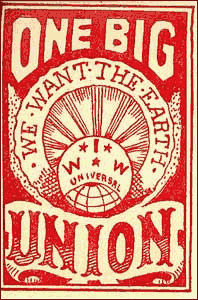
By the last half of the nineteenth century, working conditions in American factories, mines, and mills were deplorable. Industrialists were ruthless about making money at the expense of the health and safety of the workers. They looked upon their employees as less than human.
No labor laws existed to protect the men, women and children who poured into northern industrial centers. The cheapest of laborers were the freed slaves from the South and poor immigrants from all over Europe, escaping famines, devastating wars, and repressive regimes. Slavery was officially outlawed in the United States, but the treatment of black people was little different than before the Emancipation Proclamation.
May 25, 2015 Read the whole text...
Julie Herrada
Sabotage
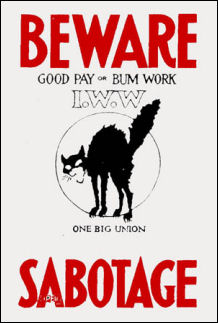
Direct action (legal and illegal) and sabotage had been used by the U.S. and European labor movements as a method of class combat since the rise of industrialism.
These tactics allowed workers to fight back using whatever tools were available to them, and was viewed as a viable method of achieving worker demands outside of political channels. The IWW promoted direct action after the 1908 split with the Socialist Labor Party (which only advocated political action); however, it was not official union policy until 1914, and then only for a short time.
May 31, 2015 Read the whole text...
Julie Herrada
IWW Free Speech Fights
Because of the IWW’s mission to organize all workers into One Big Union, immigrants, migrants, blacklisted, unskilled, itinerant, and other hard-to-reach workers were sought by Wobbly organizers as potential members. Organizers weren’t allowed into the shops, factories, or lumber camps, so they congregated on street corners and in town squares where they would address workers from soapboxes, urging them to join the union.
May 31, 2015 Read the whole text...
Julie Herrada
World War I: The Chicago Trial
“No war but the class war” was the expressed motto of many radicals who refused to enlist or otherwise contribute to any national war effort. At their tenth convention in 1914, the IWW passed a resolution stating, “We as members of the industrial army will refuse to fight for any purpose except the realization of industrial freedom.”
Jun 1, 2015 Read the whole text...
Anu Bonobo
Wobbly Without Work?
Reflections on the IWW anniversary
If there’s any idea promoted by the Wobblies that needs revision, it’s their concept of “One Big Union.” Even if one big union were doable, it may not be desirable. If I had to bet on it, I’d predict it will be One Big Corporation that will demonstrate to us the dystopian nature of “uniting” seven billion people. (Look for a global company like WorldMart in the future.) While the international capitalist system should stimulate global solidarity among non-elites, our struggles and solutions are necessarily local, regional, and decentralized.
Jun 7, 2015 Read the whole text...
Judith Malina
Every One of the Cleaning Women
from Love & Politics: Poems by Judith Malina (Black & Red 2001) P.O. Box 02374, Detroit MI 48202, $6. Also available from The Barn; See p. 55 for address.
Dreamt of something else
When she was seventeen.
They smile, they joke, they sigh,
In their smocks and comfy shoes--
They try not to recall the plans
For a miracle or a marriage...
Jun 7, 2015 Read the whole text...
John Pietaro
Wobblies & Music
A Century of Radical Song: The IWW’s Singing Labor Movement at 100
Is there ought we have in common with the greedy parasite,
Who would lash us into serfdom and crush us with his might?
Is there anything left for us but to organize and fight?
The Union makes us strong!
—“Solidarity Forever”
Looking back on the first century of the Industrial Workers of the World, the singing labor movement which brought us the Musician-Organizer, one can delve into its wealth of song to understand the urgency of its mission to create One Big Union that would replace wage labor and the state.
Jun 7, 2015 Read the whole text...
Don LaCoss
Strip Mining Big Rock Candy Mountain
A Tuneful Utopia
“The Big Rock Candy Mountain” has to be one of the greatest anti-work anthems in American popular music. One-time Wobbly busker and radio-show hillbilly Harry McClintock of Knoxville, Tennessee connived to claim authorship of the song in the mid-1920s (as he also did with another one of the IWW’s greatest hits, “Hallelujah, I’m a Bum”), but the song has existed in one form or another since the nineteenth-century. Hal Rammel, in his ambitious and imaginative study Nowhere in America: The Big Rock Candy Mountain and Other Comic Utopias (1990), goes further and traces the song’s genealogy back to old European folk practices like the carnival and mummers’ plays. The song is a scruffy paean to the most potent weapon of the weak: the utopian imagination that can supersede the grim miseries of oppression, exploitation and want.
Jun 8, 2015 Read the whole text...
Walker Lane (Peter Werbe)
Billy Bragg
Drinking Joe Hill’s Ashes
Interview with Billy Bragg
Note: FE staffer Walker Lane interviewed Billy Bragg, the English singer/songwriter, when he played a 1998 Labor Day benefit for striking Detroit newspaper workers.
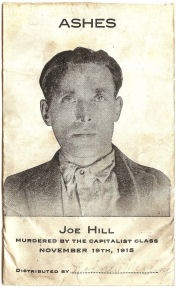
Lane: Rumor has it you once drank a glass of beer containing the ashes of the famous Wobbly songwriter, Joe Hill.
Bragg: It’s true, actually. Joe Hill was executed by the state of Utah in 1915 after a frame-up trial. When he died, he was cremated, and they had asked him where he wanted to be buried. He answered, “Anywhere but in Utah,” where he had been executed by a firing squad. So, what the Wobblies decided to do was to send his ashes to every union branch in the United States. They put them in little packets and mailed them out.
Jun 8, 2015 Read the whole text...
Sid Brown
Still Wobbly After All These Years
A mini-memoir
I was a Wobbly in the late 1950’s, through a portion of the tumultuous ‘60s and into the always seeking-sometimes finding, ‘Seventies. Learning and honoring the historic traditions of the IWW and sharing tasks and decision-making with “fellow workers” changed my working life and continues to affect my creative endeavors.
Jun 8, 2015 Read the whole text...
Molly Maguires
It Used to be the Red Scare...
Now, it’s the Green Scare
“We should war with relentless efficiency not only against anarchists, but against all active and passive sympathizers with anarchists.”
—President Theodore Roosevelt, annual address to Congress, December 3, 1901
“It is time to take a look at the culture and climate of support for criminally-based activism like ELF and ALF and do something about it. Just like al-Qaeda or any other terrorist organization, ELF and ALF cannot accomplish their goals without money, membership and the media.”
—Senator James Inhofe, US Senate Environment & Public Works Committee, May 18, 2005
Jun 8, 2015 Read the whole text...
Various Authors
Looking for Work and Finding It!
by Alan Franklin
He called me a peculiar, bungling misfit, and right away I knew things weren’t going to work out quite as well as I’d hoped. Oh, sure, I’d filled out the form all right, even signed my name at the bottom as best I could remember it, but I could see from the disposition of his ears that expressing an appreciation of my efforts was not at the top of his to-do list.
Jun 8, 2015 Read the whole text...
Franklin Rosemont
Red In More Ways Than One
Carlos Cortez and the Native American/Wobbly Connection
Throughout U.S. history, the lives and struggles of Native Americans have been disregarded and disdained by the white, middle-class, christian, capitalist, Nature-despising national Establishment. Sadly, the disregarders and disdainers also included the great majority of socialists, communists, anarchists, trade-unionists and others who considered themselves critics and opponents of that Establishment.
Jun 8, 2015 Read the whole text...
Jeff Ditz
The Wobblies
Review
a review of
The Wobblies! A Graphic History of the Industrial Workers of the World, Edited by Paul Buhle and Nicole Schulman, Verso, New York, 256pp., $25
In the book, Wobblies! A Graphic History of the Industrial Workers of the World, acclaimed New Left historian Paul Buhle and Nicole Schulman of World War 3 Illustrated have put together a unique, lively, accessible and entertaining history of the most important union in American history. They use the style of a graphic novel and the contributions of many artists to show this complex history from the point of view of the participants.
Jun 9, 2015 Read the whole text...
Anu Bonobo
After the Deluge, Processed World
Review
a review of
After the Deluge: A Novel of Post-Economic San Francisco by Chris Carlsson. Full Enjoyment Books, 2004, $14 from the Barn or available for free download at fullenjoymentbooks.com
Processed World, 2005 edition, $7 from the Barn, or processedworld.com
Even alienated office nerds and overachieving, working class intellectuals need an anti-authoritarian forum. That’s how I remember Processed World (PW) from my immersion in the anarchist zine scene of the 1980s. Unmistakably Bay Area in its bad attitude and aesthetic orientation, it was as much a staple of the Reagan-era underground and its left coast, printed propaganda as Homocore and Maximum Rock n Roll.
Jun 9, 2015 Read the whole text...
Stuart Christie
Antonio Tellez Sola
Anarchist, guerrilla, historian (January 18, 1921-March 27, 2005)
Antonio Tellez Sola died at his home in France at 84. He was one of the last survivors of the Spanish anarchist resistance which fought to overthrow the Franco dictatorship in Spain following the fascist triumph in 1939. He was also one of the first historians of the post-civil war urban and rural guerrilla resistance to the regime. In his actions and his writings, Tellez personified refusal to surrender to tyranny.
Jun 9, 2015 Read the whole text...
Don LaCoss
The Lynching of Wobbly Frank Little
Film review
a review of
“An Injury to One” (2002). Written and directed by Travis Wilkerson
Tensions in Butte, Montana between the Anaconda Copper Company, unions, and workers had been becoming more serious for about a decade when 164 men perished in the grisly Speculator Mine fire of June 1917.
When it became clear that the disaster was due to Anaconda’s contempt for safety regulations, 14,000 strikers took to the streets. However, the US had just entered the First World War and copper was a vital part of munitions production, so labor disputes in Butte were construed as a threat to national security. Newspapers owned by the bosses denounced the strikers as “pro-German” terrorists, and Federal troops soon arrived to quash unrest by putting Butte under martial law and forcing the miners back to work.
Jun 11, 2015 Read the whole text...
MaxZine Weinstein
Stop Assimilating; Start Revolting
Book review
a review of
That’s Revolting! Queer Strategies for Resisting Assimilation, Edited by Mattilda, (AKA Matt Bernstein Sycamore), Soft Skull Press, Brooklyn, 2004, 318 pages, $16.95.
With a new collection of essays compiled in That’s Revolting!, radical queer activist Mattilda puts the fun and glamour into radical queer resistance. It starts with a cover featuring a close-up of a mouth covered in lipstick and glitter and encourages the reader to “pick it up and smash something.”
Jun 11, 2015 Read the whole text...
Fifth Estate Collective
Resistance Calendar
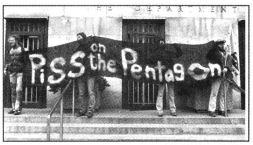
Glassner/Phantasm Photography
ONGOING EVENTS
Sept. 6-Nov. 26
“Soapboxers and Saboteurs: 100 Years of Wobbly Solidarity.” An exhibit highlighting materials from the Labadie Collection, one of the world’s best collections of materials documenting early IWW history.. Special Collections Library, 711 Hatcher Library, University of Michigan, Ann Arbor, Michigan 48109–1205. Open to the public. See October 19 for accompanying reception.
Jun 11, 2015 Read the whole text...
Fifth Estate Collective
Books from The Barn
Fifth Estate bookstore
Complete catalog available from pumpkinhollow.net/thebarn
Creating Anarchy by Ron Sakolsky
(Fifth Estate Books 2005) $15
Twenty chapters in a dynamic collage of ideas and action. This vibrant collection glows with flames of discontent and defiance and flows with waves of laughter and possibility. Ranging widely from Mayday to Utopia, from Refusal to Autonomy, and from Insurrection to Imagination, this compilation is in turn defiant, reflective, and playful--a brick for hurling through the windows of despair and a doorway to creating an anarchy that is not afraid to dream.
Jun 11, 2015 Read the whole text...

